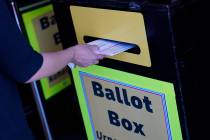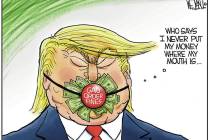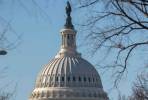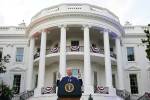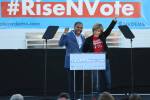With ‘success’ like this, who needs failure?
No one can accuse congressional Democrats and President Barack Obama of being unsuccessful in moving their agenda since the January 2009 inauguration.
Norman Ornstein, an American Enterprise Institute scholar, rates the current activist Congress as "at least on a par with the 89th Congress" of 1965-66 that passed sweeping voting rights and Medicare laws. But Ornstein adds that Republicans have been waging a successful opposition while tapping into popular discontent with what this Congress has enacted.
In early 2009, Congress passed an $800 billion stimulus package, running up an incredible debt. Yet very little was directed to jump-start the country's economic engine -- the private sector. Most was spent to ensure that government employees from the local to the federal level were spared from the unemployment rolls. Incredibly, even the president has admitted that there were never really any "shovel-ready" projects in the stimulus -- a complete reversal of what he repeatedly promised last year.
The president also signed into law other significant pieces of legislation during this proactive Congress:
-- Making college loans more affordable, but also instituting a government takeover of college loans.
-- Instituting a "Cash for Clunkers" program, ostensibly to rejuvenate the auto industry.
-- Making it easier for women to challenge pay discrimination.
-- Enacting new protections for credit card users.
-- Increasing federal regulation of tobacco.
-- Making attacks based on sexual orientation a federal "hate crime."
-- Giving businesses tax incentives to hire unemployed workers.
-- Granting tax credits to first-time home buyers.
Of course, the two signature bills of the 2009-10 congressional session were the health care law and the so-called Wall Street reform law.
The Obama administration spent more than $700,000 of taxpayer money in a public relations campaign to convince Americans to support the trillion-dollar plan to socialize the nation's health insurance system -- after it had already been signed into law.
The administration tried the same thing regarding the stimulus law. Among its public relations bag of tricks, it awarded consultants $363,760 to brag about all the health research pork that was spread about -- including establishment of a website where visitors could learn about a $12.2 million grant the National Institutes of Health spent on a "Facebook for Scientists."
In spite of this spin, polling over the past two years underscores that a large majority of Americans don't appreciate the Democrats' congressional "success" achieved with no GOP input and, in some highly publicized instances, no proper vetting of legislative language. One current poll says three-fourths of Americans disapprove of Congress, and the president's approval is at an all-time low in the mid-40s.
It is significant that polling during the 1965-66 Congress indicated that a large majority had faith in the federal government doing the right thing. Polls now indicate a large majority of Americans actually fear the expansion of the federal government.
Why is this so? One reason is that in big Democratic states such as California and New York, public employees were bailed out with stimulus funds. They are making at least $10,000 more in pay and benefits than the average worker, Pat Buchanan has pointed out. It is the private-sector worker who is going deeper into debt while subsidizing the public sector.
Will President Obama and a Democratic congressional leadership addicted to bailouts, massive spending and high taxes act to trim back government? Will they continue to simply "protect their own" -- especially the big labor union bosses and public-sector employees -- while presiding over the dismantling of the private enterprise system? These are questions raised by many voters, especially the anti-tax, smaller government tea party movement that has and is gaining so much attention.
Yes, President Obama and the Democratic Congress had a successful run in forcing their big-government takeover agenda on the American people. But a growing number of discontented Americans feel they are about to be undone. This is why the Tuesday election is shaping up as an historic game-changer.
J.C. Watts (JCWatts01@jcwatts.com) is chairman of J.C. Watts Companies, a business consulting group, and the former chairman of the Republican Conference of the U.S. House, where he served as an Oklahoma representative from 1995 to 2002. He writes twice monthly for the Review-Journal.















